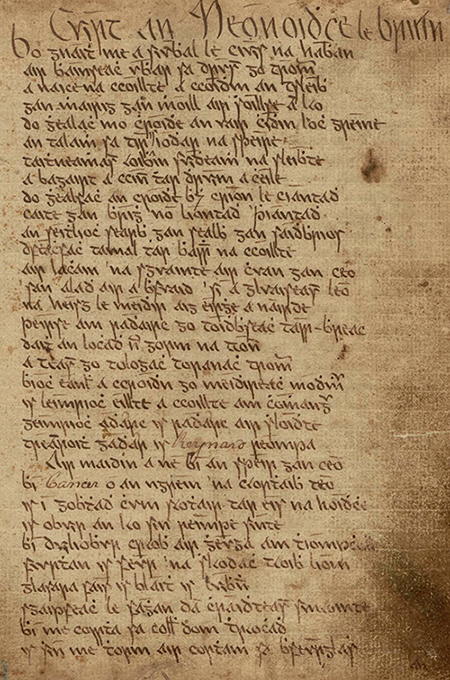Cúirt an Mheoin-Oíche (The Midnight Court) is a satiric, bawdy eighteenth-century Irish poem (1026 lines) composed by Brian Merriman († 27 July 1805),1 who lived in Feakle, Co. Clare, where the the proceedings of this imaginary ‘court’ take place. The text is based on MS Cambridge Additional 6562, now housed in the University of Cambridge Library.2 Its editor, Liam Ó Murchú, has convincingly demonstrated that this manuscript contains ‘the book of the author himself’ (‘leabhar an ughdair féin’), as claimed by a relative of Merriman’s, who was in possession of the autograph original.3 Little is known about Merriman, but the Irish scholar John O’Donovan learned, on a visit to Co. Clare in 1839, that he held a small farm on Loch Gréine, kept a hedgeschool, and later moved to Limerick. The poem parodies the traditional aisling ‘dream’ or ‘vision’ poem. Its author beholds not the conventional beautiful woman, but a huge, broad-bottomed woman who drags him off to a ‘court’ (cúirt) of women, presided by a female judge named Aoibheall. The complaint is that number of marriages and offspring has fallen, and single Irishmen (the author among them) refuse to marry or are married off to old, rich women. A young woman and an old man present claim and counterclaim in robust poetic monologues full of talk about sex (or the lack of it), of women left unsatisfied and men useless in bed. The young woman speaks first, claiming that her beauty, fine dress, wit and wooing fail to secure her a suitable man. Up jumps the old man, who launches into a vicious tirade. He maligns the young woman’s poverty; he rants about being duped into marriage and the baby that is not his own; he calls on the judge to abolish marriage and let free love reign. The young woman hits back with a verbal virtuosity which ‘demolishes the old man’s arguments entirely.’4 She defends his wife, trapped in marriage with an impotent miser. A selection from the older man’s monologue is read here by the editor, Dr Liam P. Ó Murchú (DLittCelt (propter opera edita) NUI 2015), in the Munster dialect. He notes that in the recording, he speaks the manuscript form dícheall mhuar, noted in his list of ‘Forms from the MS’ (‘Foirmeacha as an LS’, Cúirt, p. 47), in place of dícheall muar in the printed text (Cúirt, p. 29, line 383). A selection from the young woman's monologue is read here by Dr Síle Ní Mhurchú, University College Cork.
1 The death of Merriman, ‘a teacher of Mathematics’, was recorded in the General Advertiser and Limerick Gazette on 29 July [Monday]. He died on Saturday, 27 July 1805. See R. Ó Foghludha, Cúirt an Mheadhon Oidhche (Dublin 1912), pp. 171-72.
2 Pádraig de Brún & Máire Herbert, Catalogue of Irish manuscripts in Cambridge libraries (Cambridge 1986), p. 86.
3 As Ó Murchú notes (Cúirt, pp. 11-12), John O’Donovan (Clare Ord. Letters, ii, 161-2) first visited the ‘very wild and sequestered district’ of Loch Gréine, Co. Clare in 1839 and reported the following: ‘The autograph original is in the possession of his [Merriman’s] relative, Anthony Howard (O’Hiomhair) who lives near Milltown Malbay in this County’. In 1862 the scribe Seán Ó Dálaigh made a copy of Cúirt an Mheon-Oíche from a book in the possession of ‘Antoine O h-Úmhair’, who claimed that it was ‘leabhar an ughdar féin’ (‘the author’s own book’). This book, Ó Murchú concludes, is Cambridge Additional 6562. For a discussion of the manuscript and the poet’s biographical details, a few of which I note here, see Ó Murchú, Cúirt, pp. 9-14.
4 M. Ní Úrdail, ‘The representation of the feminine: Some evidence from Irish-language sources’, in Eighteenth-Century Ireland/ Iris an dá chultúr 22 (2007), 133-150, p. 143.


